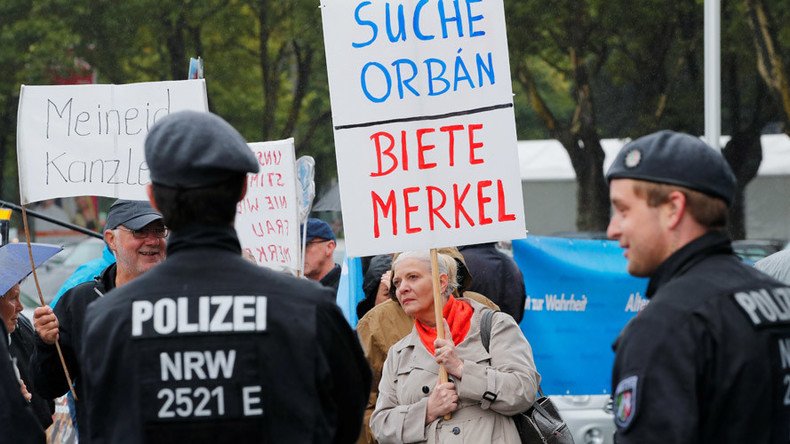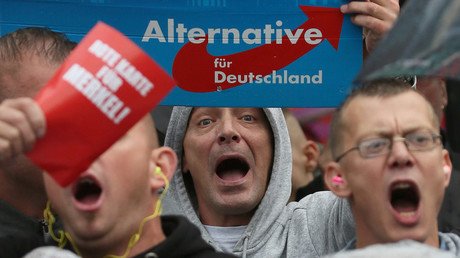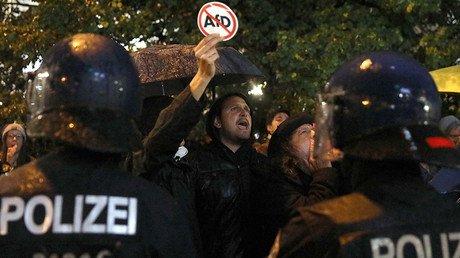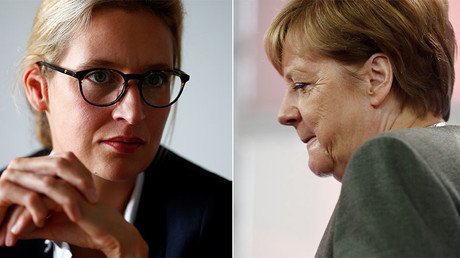‘Foreseeable result’: German poll outcome & rise of AfD were predictable, say Russian MPs

The victory of the ruling CDU/CSU bloc in Germany’s parliamentary polls and the strong performance of the AfD can be explained by the economic and migrant crisis in Europe, which cannot be disguised by false claims of Russian interference, senior Russian MPs have said.
“I am asking myself a question: why has the argument about the ‘inevitable Russian involvement’ in German elections, which was actively spun on the first stage of the elections campaign in Berlin and other European capitals, completely left our screens in the last two or three months?” the head of Russia’s upper house Committee for International Relations, Senator Konstantin Kosachev, wrote on his Facebook page. “My answer is that this has happened because the elections outcome was known beforehand.”
The senator added that the trick with false news about Russian interference was typically used in situations when political competitors were more or less equal, in order to give an additional impetus to voters.
“In France, [Emmanuel] Macron’s chances were not so clear and they used the ‘Russian interference’ plot to the end. When [Hillary] Clinton could not stretch the results to victory they used the ‘Russian email hack’ argument. When they failed to put WikiLeaks under control they claimed that Russians have [Edward] Snowden,” Kosachev wrote.
The head of the upper house Commission for Information Policy, Senator Aleksey Pushkov, wrote that the results of the German polls were proof that the public mood in Europe is shifting to support various alternatives to the current pro-EU governments.
“In Germany we see a shift towards a political alternative. Merkel’s party received less than planned while the Alternative [the AfD or Alternative for Germany party] got more than the forecasts had said. This is the price of their policy of open doors,” Pushkov tweeted.
The head of the State Duma Committee for International Relations, MP Leonid Slutsky, said that in his opinion the results of the German parliamentary elections were an expected reaction to the social and economic crisis in Europe, including the situation with immigrants.
“The results of the Bundestag elections turned out to be foreseeable – both the victory of Angela Merkel’s CDU/CSU bloc and that fact that the Alternative for Germany rightist party received parliamentary seats,” Slutsky said in comments with Interfax. “The latter was hardly a surprise for me, even though AfD leaders compare this result to an earthquake,” he added.
Slutsky also told reporters that the relative success of the AfD was not a surprise in the context of the general European crisis manifested both in the social and economic situation and the barely controllable influx of immigrants.
“The Alternative for Germany is an analogue of France’s National Front that, as we know, has got the highest share of votes at this year’s elections throughout its whole history. We can see that Europe is looking for an idea that would bring back the freedom of choice and independence from the ‘big brother’ across the ocean.”
The head of the international affairs department of Russia’s Central Elections Commission, Vasily Likhachev, said that the high results of opposition parties meant bad news for Angela Merkel and her ruling bloc.
“The SPD’s declaration of intention to join the opposition means that the opposition bloc in the new Bundestag will be very serious, with members of both Martin Schulz’s Social Democratic Party of Germany and the Alternative for Germany. Even these two parties would become a serious force that would affect the political landscape and the approach to domestic and international problems,” Likhachev said.
“For me it is absolutely clear that the future Chancellor Merkel would face the major problem in forming a coalition,” he noted.
According to preliminary results of Sunday’s polls, the right-wing AfD will enter parliament for the first time in its history with 12.6 percent of the vote. Merkel’s CDU, allied with Bavaria’s CSU, won with 33 percent and the center-left SPD claimed a historically low result of 21 percent.















